





|
Hasiera · Home |
|
Ezaugarriak · Features |
|
Oharrak · Notes |
|
Sarrera · Introduction |
|
Euskara |
|
Folklore |
|
Kirolak · Sports |
|
Musika · Music |
|
Janedanak · Gastronomy |
|
Tokiak · Places |
|
Historia · History |
|
Politika · Politics |
|
Diaspora |
|
Internet |
|
Albisteak · News |
|
Nahas Mahas · Misc |

For security reasons, user contributed notes have been disabled.
by David Cox
 David Cox is employed as a writer and editor and lives in Ontario, Canada. David also contributes review articles to the U.S -based internet publications rambles.net and rootsworld.com, where he writes about European world-roots music, specializing in the music of Euskal Herria and Cymru-Wales. His hobbies include studying the Basque and Welsh languages and playing Euskopoli with his children. David Cox is employed as a writer and editor and lives in Ontario, Canada. David also contributes review articles to the U.S -based internet publications rambles.net and rootsworld.com, where he writes about European world-roots music, specializing in the music of Euskal Herria and Cymru-Wales. His hobbies include studying the Basque and Welsh languages and playing Euskopoli with his children.
|
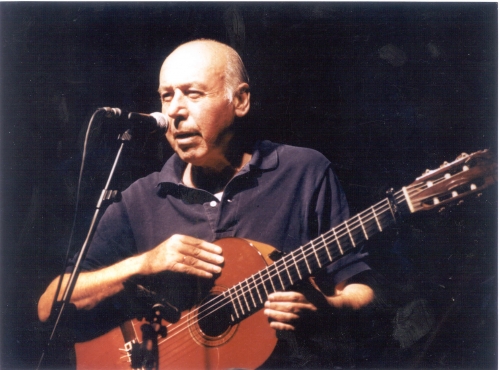 |
| Mikel Laboa |
In contemporary Basque music, one name stands above all the others.
Born June 15, 1934, Mikel Laboa Manzisidor passed the civil war years in Lekeitio, but is most closely associated with the city of Donostia, where he was raised in a musical family -- and a political one.
His was an ancient and mysterious voice, sometimes incomprehensible, a voice that seems to come from the depths of the Basque soul.
Having virtually invented Basque popular music in the 1960s, Laboa maintained his influence through the decades, as Basque music eveolved.
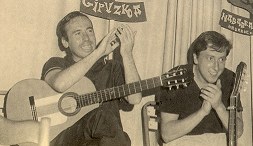 |
| Mikel Laboa with Benito Lertxundi in 1970 |
Laboa's first solo recording was made in Bayonne-Baiona in 1964. It included four folk songs, 'Oi Pello Pello', 'Amonatxo', 'Berreterexen Kanthoria', and 'Haurtxo Txikia'.
In such songs as these, or the mysterious 'Goizuetan,' Laboa set the standard for the spectacular development of Basque-language music -- a music deeply rooted in the songs, the stories, the instruments and other traditions of a culturally distinct people.
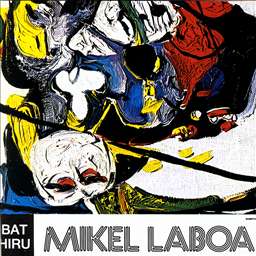 |
| Bat-Hiru |
His favourite sources for texts, apart from folk traditions, included Brecht, Atxaga and Sarrionandia, Artze and Lete. His musical influences included Atahualpa Yupanqui, Silvio Rodriguez, and the Setze Jutges of Catalunya. He sang in at least half-a-dozen languages, including his own, but the entirety of his work was euskaldun.
The fragile position of any language that is spoken by a minority within its own country is addressed by Laboa again and again.
"Our words, say them again and again/so they are not forgotten, so they are not lost," sang Laboa in 'Gure Hitzak' (Atxaga).*The singer was also a psychiatrist.
In 'Kiromantzidxa' (Sarrionandia) Laboa seems to analyze an entire people. "I see the goverment and power against you...the police, the judges the financiers."
His legacy
His own songs are recorded again and again. The group Negu Gorriak takes its name from the lyrics of a Laboa song, 'Gaberako Aterbea' (Brecht) recorded by that group. Fermin Muguruza's concept for Inkommunikazioa -- Komunikazioa came from Laboa.
In the post-millennium era, Basque music took on a new form, a fusion of international styles with local traditions. This manifested itself in different ways, but most notably in Kepa Junkera's magical reinvention of the trikitixa (diatonic accordion) and Oreka Tx's use of the txalaparta. This trend is anticipated by Laboa's 'Ezpata Dantza' which is a piano-txalaparta duet; and by 'Elgeta' where the twin accordions of Joseba Tapia and Iker Goenaga merge with voice and synth.
Beginning with Junkera's CD Maren, his later CD Hiri, and finally with Oreka TX's Nomadak TX project, the development of Basque music leapt forward by marrying traditional Basque sounds with world musics. On this last, notable project, Laboa's 'Martxa Baten Lehen Notak' (Artze) is featured (he speaks rather than sings the lyric). This song is a kind of Internationale for the forgotten, stateless peoples. Trikizio also recorded the song -- in Catalan.
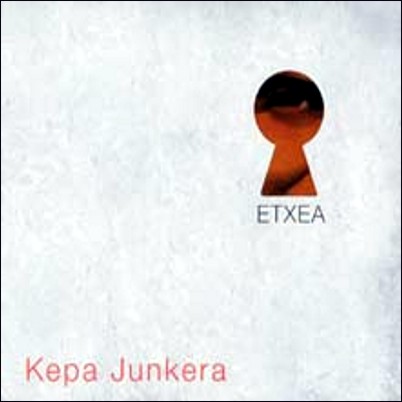 |
| Junkera's Etxea |
While folk music is the obvious repository of the culture, Basque themes and instruments are now incorporated into children's music -- Takolo, Pirritx eta Porrotx pay direct tribute in Poxpolin Marisorgin -- just one example.
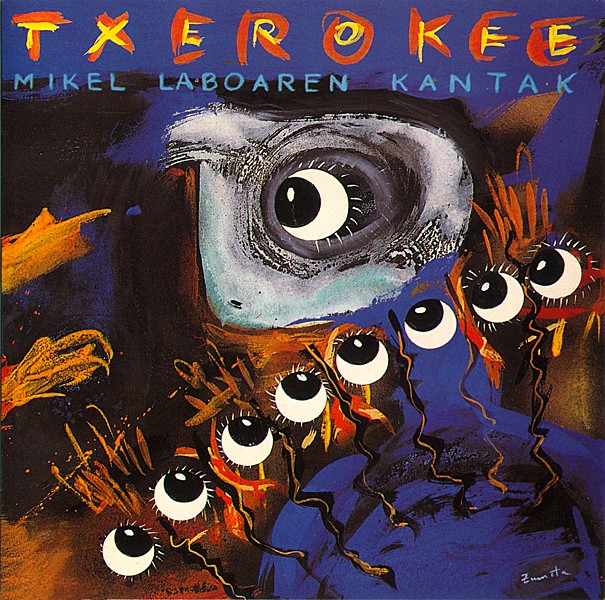 |
| Txerokee |
Laboa's greatest and simplest song, 'Txoria Txori' (Artze), was recorded by Joan Baez, among others. This song of freedom has universal resonance.
When Laboa died, the Basque world lost a major creative force. Laboa was a true artist, always unafraid to try something new and experimental. Even if you didn't like it, it challenged you. He was never afraid to add new colours to his palette.
His work has so many hidden surprises, that (to paraphrase 'Gure Bazterrak' - Artze) 'when the mist hides it from me, it is then that I begin to see what is hidden.' With 17 recordings, by some counts, and so many hidden gems, so much of his work still lies waiting to be discovered by many.
A true artist treads in new territory without fear. That artist, rather than working alone, collaborates with others who have complementary talents. The work challenges for your attention. Such an artist was Mikel Laboa.
*Lyric author in brackets after song title unless credited as traditional.
Selected discography (all discs Elkar)
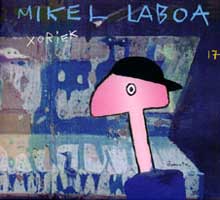 |
| Xoriek 17 |
Zuzenean, 1997 (live)
Gernika Zuzenan 2, 1999 (with choir and orchestra)
Xoriek 17, 2005
Film
(Soundtrack): La Pelota Vasca, Julio Medem
Nomadak TX
Further reading
Mikel Laboa (Elkar, 1995) Basque or Spanish
Links
http://eu.wikipedia.org/wiki/Mikel_Laboa
http://es.wikipedia.org/wiki/Mikel_Laboa
|
Please report any problems or suggestions to Blas. Eskerrik asko! |





